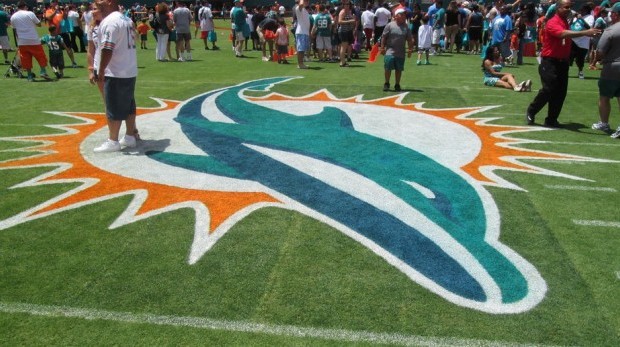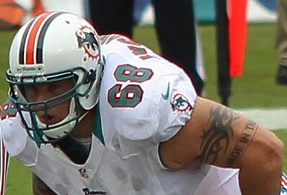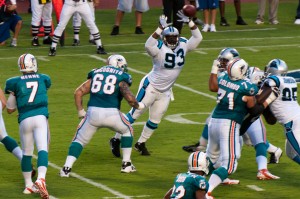Richie Incognito: Loose cannon or leader of a hostile work environment?
The Miami Dolphins seem to be caught in the middle of potential litigation regarding the lack of control over their locker room environment.
Seemingly everyone has been inundated with the allegations that former Miami Dolphins lineman Jonathan Martin was bullied by teammate Richie Incognito, and everyone seems to have an opinion—especially current players, talk show hosts, fans, and bosses—about what should be considered bullying in a football locker room. However, whether the Miami Dolphins could face liability for maintaining a Hostile Work Environment (“HWE”) may become the main headline in this controversy.
The blame was pointed most at Richie Incognito, who took the brunt of a thorough investigation into his past.
The bullying controversy arose after Jonathan Martin left the Miami Dolphins football team and checked into a hospital earlier this season. Martin claimed the NFL environment was too much for him to handle, and that bullying from teammates was the primary reason for his departure. A few days after Martin had departed from the team, a voicemail from Martin’s former teammate Richie Incognito was leaked to the media. The voicemail was explicit in nature and seemed to shed some light on what appeared to be a racially charged vendetta Incognito pursued against Martin. Soon after the voicemail, more allegations surfaced that Martin was the constant object of Incognito’s harassment.
The voicemail and additional allegations snowballed into finger pointing and posturing by Martin, Incognito, the Dolphins organization, and the NFL. The latter three attempted at all costs to avoid being labeled “bullies” or enablers of a hostile work environment. The blame was pointed most at Richie Incognito, however, who took the brunt of a thorough investigation into his past. For instance, it came to light that Incognito was investigated for sexual harassment against a volunteer at the Miami Dolphins’ annual golf tournament in May of 2012. While charges were never filed against him, a police report stated that Incognito engaged in inappropriate behavior. Additionally, Incognito was reported to “regularly” hold offensive lineman meetings in strip clubs, and berate his fellow teammates that objected to the location. Moreover, Incognito and others were alleged to have pressured Martin into paying for an unofficial team trip to Las Vegas, costing him $15,000, even though he refused to join his teammates on the trip.
Ironically, Incognito was one of the six players voted onto the leadership council for the Miami Dolphins this year (apparently, but not surprisingly, he was reported as the most vocal of the six). The leadership council acts as the liaison between coaches and players whenever problems arise. Stories about Incognito continue to surface, with one report indicating that Incognito and at least one other teammate mocked a team staff member about his ethnicity and wife. These interactions between Incognito and the Miami Dolphins staff member allegedly took place in front of other Miami Dolphins staffers. As the evidence mounts against him, the question remains whether the Dolphins can be held primarily responsible for Incognito’s actions.
“An employee may have a reputation as a harasser among those in his vicinity, but if no complaint makes its way up to management, the employer will escape liability under the negligence standard.”
To analyze whether Martin would be successful in a workplace harassment lawsuit for maintaining a hostile work environment, it is best to observe how precedent established by the courts coincides with the facts about Martin, Incognito, and the Miami Dolphins.
In Rogers v. EEOC, the Fifth Circuit ruled that Title VII of the Civil Rights Act of 1964 “affords employees the right to work in an environment free from discriminatory intimidation, ridicule, and insult.” The Rogers case dealt with an employer who was alleged to have maintained an offensive work environment primarily because the employer was exclusively discriminatory against Hispanic workers.
Additionally, a hostile work environment claim must occur over a period of time or consist of several acts. The rule of thumb is that the severity of an allegation usually has an inverse relationship to the repetition of an alleged act (a person is usually more likely to report an act of violence against them as opposed to constant harassment). The Supreme Court of the United States ruled in Harris v. Forklift Systems, Inc. that Title VII protection is violated if the intimidation, ridicule, or insults were “sufficiently pervasive or severe to alter the conditions of the victim’s employment and create an abusive working environment.” The Court stated further that the conduct must be perceived as abusive by the person claiming the HWE. Yet notably, there is no need for any psychological injury to occur if the work environment would reasonably be perceived as hostile or abusive. Importantly, a court’s decision on what is considered a “hostile” environment depends on the totality of the circumstances.
There is additional case law outlining when an employer can be held liable if the allegations of harassment stem from the co-workers of the claimant. In the recent U.S. Supreme Court case of Vance v. Ball State University (pdf), the Court ruled that “if the harassing employee is the victim’s co-worker, the employer is liable only if it was negligent in controlling working conditions.” Consequently, different rules apply if the harassment was done by a supervisor (someone who has hiring, firing, transferring, or disciplinary power). The Court stated that an employer is negligent if they “knew or reasonably should have known about the harassment but failed to take remedial action.” This can include failure to monitor the workplace, failure to have a system in place to register complaints, and failure to respond to complaints.
The dissenting opinion in Vance makes a point that speaks directly to the Miami Dolphins’ issue, however: “an employee may have a reputation as a harasser among those in his vicinity, but if no complaint makes its way up to management, the employer will escape liability under the negligence standard.”
If the people in power with the Dolphins were aware of the bullying, then it seems no steps were taken to remedy any harms, and Martin would have an excellent case against his former team.
The Vance decision makes it clear that the Miami Dolphins will be held liable for a hostile work environment if they were negligent in controlling the working conditions of their organization. Questions may arise as to whether Incognito might have been in a supervisory role because of his status as a member of the team’s leadership council; however, this can be dismissed since his power was more symbolic than actual in nature. In short, Incognito never had any real authority over Martin’s job status.
The issue of negligence in this case focuses on whether the Miami Dolphins reasonably should have known about the environment that Martin was subjected to. It may be presumed from the reports that the Dolphins’ head coach and front office (“supervisors”) were not directly told about Incognito’s bullying habits of Martin. If the people in power with the Dolphins were aware, then it seems no steps were taken to remedy any harms, and Martin would have an excellent case against his former team.
But what if Martin’s supervisors were never directly told about Incognito’s harassment or their potential HWE? In this instance, a court would examine the “totality of the circumstances” surrounding the locker room atmosphere. One of the critical questions would be whether the past issues with Incognito would have placed the Dolphins on constructive notice that Martin was working in a hostile work environment. The organization was aware of the police report of sexual harassment at their annual golf tournament, and stated that they handled the issue internally. Also, the team could have been alerted to Incognito’s and other players’ verbal harassment of a staffer since their own employees witnessed the harassment.
Martin will most likely argue that the locker room environment as a whole established the HWE, whereas the Dolphins will likely argue they were unaware that Incognito’s actions caused the mental breakdown of one of its employees.
However, one important aspect in this work environment is the “locker room atmosphere” and traditional hazing that takes place in the NFL. Does it matter that some of the verbal “abuse” directed at Martin by Incognito was commonplace in the NFL, that rookies all around the league would pay large amounts to take out veteran players for dinners or trips, or that Martin never spoke to a person in authority about the issues he had with the alleged HWE?
Jonathan Martin has an excellent case about the pervasiveness of acts against him that occurred in the Miami Dolphins’ facilities and by players outside of work. He will also more than likely argue that the locker room environment as a whole established the hostile work environment that he was subjected to, whereas the Dolphins will predictably argue that they were unaware and had no reason to know that the actions of one individual caused Martin’s mental breakdown.
It will be interesting to see if Martin takes the next step and files charges after the rhetoric his camp has produced about the Miami Dolphins’ lack of control. It goes without saying that the consequences the Dolphins organization, coaches, and personnel face will be used as an example for the rest of the NFL franchises.








